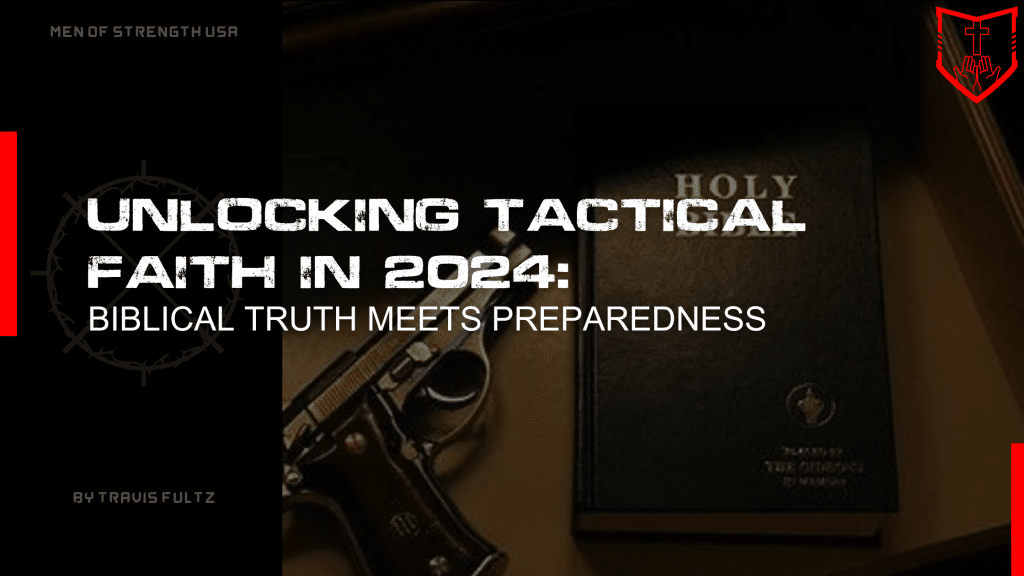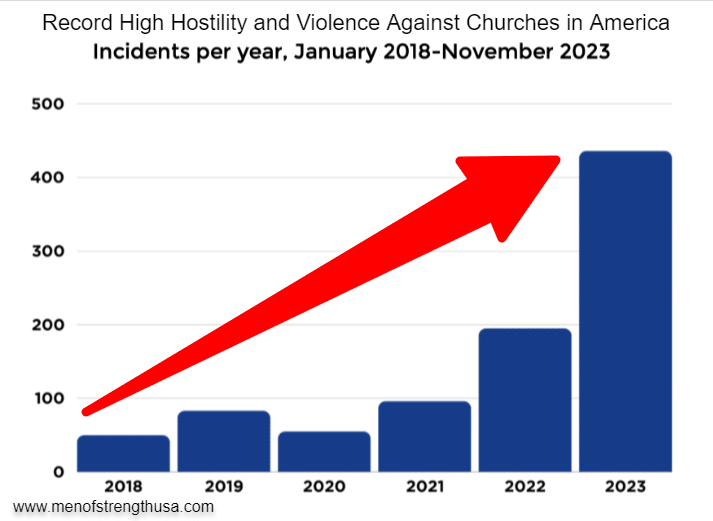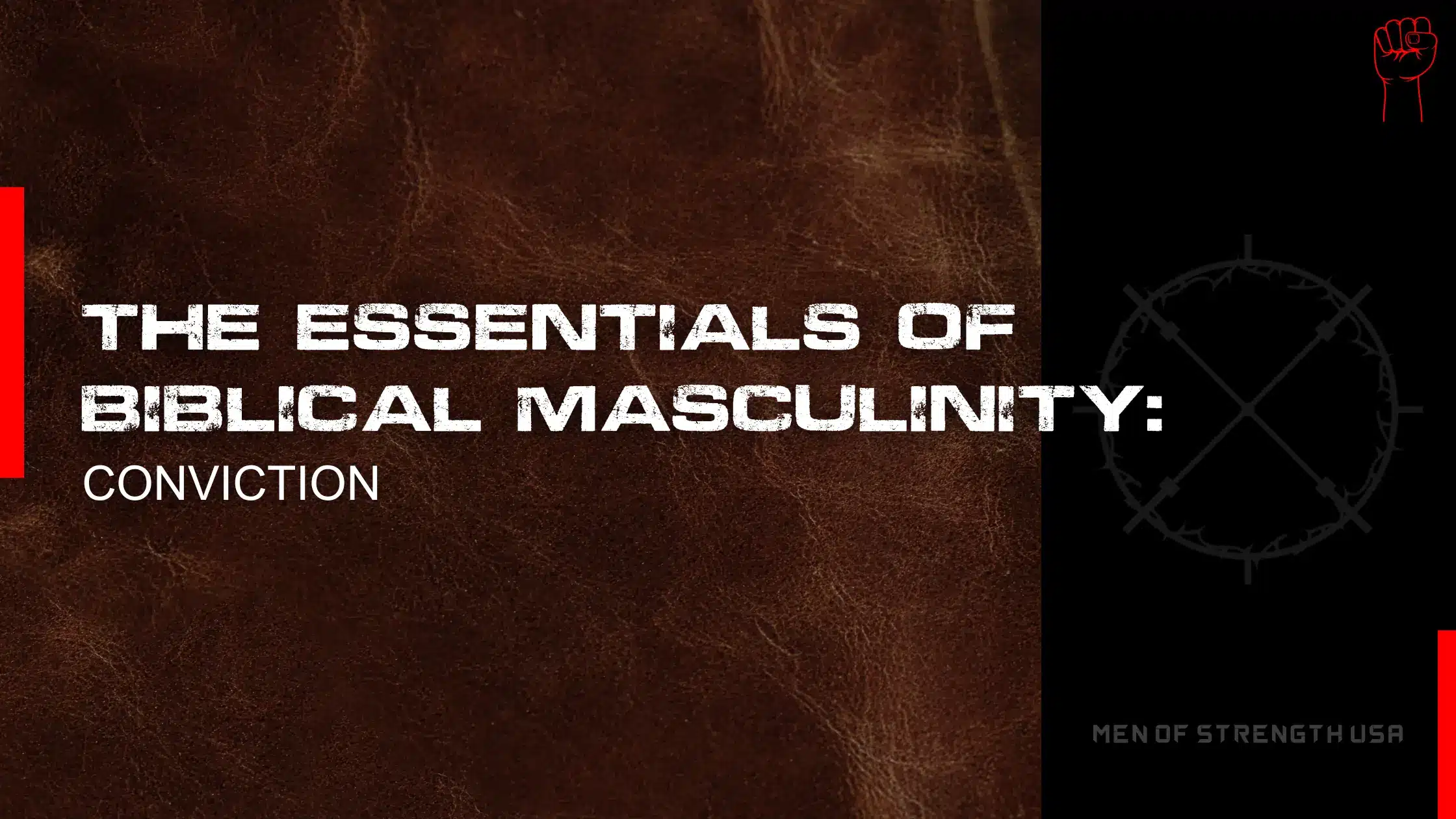This post may use affiliate links from Amazon and other retailers which earn us a commission for any purchases made through them. This is done at no extra cost to you and we thank you for the support. Learn more.
Hey there, fellow men of faith! Did you know that, as we progress through these crazy times, a large number of Christian men are expressing interest in faith-based tactical training? That’s right, more and more of us are realizing that our faith and practical readiness can go hand in hand so welcome to the world of tactical faith.
I’m sure you might be wondering, “What in the world is tactical faith?” Well, let me tell you – I know it sounds dorky, cliche, and borderline un-Christian, but it actually encompasses your calling as man of Christ. Tactical faith is all about bringing biblical truth into the realm of preparedness and self-defense.
In this article, we’re going to dive deep into how we can balance our walk with Christ with practical skills to protect the flock. Are you ready to become a true protector for the body of Christ? Let’s do this!

Understanding Tactical Faith
Alright guys, let’s break down this whole “tactical faith” thing before it get’s written off (which it probably will by most of you).
You know, when I first heard the term, I was shaking my head too. But trust me, once you get into it, it’s like a lightbulb moment especially in these crazy times.
So, what exactly is tactical faith? It is simply just taking all the love, and principles that the Bible teaches us and applying it to how we protect ourselves and particularly others. It’s the merge of biblical principles, commandments, and teachings combined with preparedness and defensive tactical training without letting biblical truth become skewed.
I already know what some of you might be thinking: “Isn’t self-defense, violence, and tactical stuff un-Christian?”
I definitely wrestled with that one too. But here’s the thing, our faith actually has a lot to say about protection and preparedness.
Let me drop some quick biblical knowledge on you:
- Nehemiah 4:17 talks about rebuilding the wall of Jerusalem with one hand while holding a weapon in the other. Talk about multitasking for God!
- In Luke 22:36, Jesus himself tells his disciples to buy a sword. Now, He’s not advocating violence here, but it shows that being prepared isn’t against our faith.
- And let’s not forget 1 Timothy 5:8, which says that if anyone doesn’t provide for their relatives, they’ve denied the faith. I’d argue that protection is part of that provision!
So we can see that this idea of tactical faith isn’t about being paranoid or aggressive. It’s about being a good steward of the life God’s given us and the lives He’s entrusted to our care. It’s about being wise as serpents and innocent as doves (Matthew 10:16).
When I started integrating my faith into my tactical training, it completely transformed my approach. Instead of training out of fear, I started training out of love – love for my family, my community, and yes, even potential threats.
It’s about being prepared to protect, but also to show Christ’s love in any situation. So, that’s tactical faith in a nutshell.
It’s not just about knowing how to throw a punch or shoot straight (although those skills can be part of it). It’s about developing a mindset that says, “I’m ready to face whatever comes my way, and I’m going to do it in a way that honors God.”
In the next section, we’ll dive into the core principles that make tactical faith tick.
Core Principles of Tactical Faith
When it comes to tactical faith, there are some key principles that really set it apart from your run-of-the-mill preparedness training. These principles have been game-changers for me!
Love and Protection
First up, we’ve got love and protection.
In the concept of tactical faith, we’re not just learning to protect ourselves but rather we’re building a heart that wants to protect others out of love.
It’s like being a shepherd, you know? We’re called to guard our flock, not just ourselves. And most importantly we have this:
"For the whole Law is fulfilled in one word, in the statement, “You shall love your neighbor as yourself.”
-Galatians 5:14
Stewardship
Next, there’s stewardship and responsibility.
This one is huge! Everything we have is from God. God’s given us our lives, our families, and our communities.
It’s our job to be good stewards of them. That means being responsible enough to learn how to keep them safe. It’s not about paranoia; it’s about preparation.
Integrity
Integrity in training and application is another biggie.
Look, I’ve been to some tactical training where it felt like integrity went out the window. But in tactical faith, we hold ourselves to a higher standard. We train hard, sure, but we do it with honesty, respect, and a focus on doing the right thing, not just the effective thing.
Service
Lastly, we’ve got service to family and community. This is where the rubber meets the road, men.
All this training, all this preparation – it’s not just for us. It’s so we can be servant leaders when our loved ones and neighbors need us most. It’s about being that rock-solid support system that others can lean on in tough situations.
These principles aren’t just nice ideas, they’re biblical and they’re the backbone of tactical faith. They guide everything we do, from how we train to how we respond in real-life situations.
Trust me, when you start applying these principles, you’ll see a real difference in your approach to preparedness and training.
Essential Skills in Tactical Faith Training
Alright, let’s get down to the essential skills you need in tactical faith training. Don’t worry if you’re starting from scratch. We all gotta start somewhere, right?
Here’s a quick rundown of what you should begin diving into:
| Skill Area | What It Means |
|---|---|
| Situational Awareness | Keeping an eye on what’s happening around you and spotting potential dangers. |
| Firearms Proficiency | Knowing how to use guns safely and accurately. |
| Self-Defense Techniques | Learning how to physically protect yourself. |
| Crisis Management | Having a plan for different emergencies. |
Situational Awareness
First up, we’ve got situational awareness through a spiritual lens. This isn’t just about keeping your head on a swivel. It’s about tuning into that still, small voice that can alert you to danger.
I can’t tell you how many times paying attention to that gut feeling (which I believe is often the Holy Spirit) has kept me out of sticky situations.
Check out this read for a deeper look.
If you want some exercises to build this skill, come join our FREE week long challenge in the Men of Strength Collective!
Firearms Safety and Training
Next, there’s firearms proficiency with a focus on responsibility. Now, I know firearms can be a touchy subject. But if you choose to own one, tactical faith is about being incredibly responsible with it. It’s not just about hitting targets; it’s about understanding the weight of that responsibility and treating it with the utmost respect.
Dive deeper on this topic here.
Self-Defense Techniques
I like to think of these defensive techniques as more than “self-defense” and for the purpose of protecting others first, but that is just what this type of training is called. Knowing how to physically handle a threat is far more likely than ever needing to use firearms.
Conflict Resolution
Non-violent conflict resolution is a skill that often gets overlooked in tactical training, but it’s crucial in tactical faith. Jesus was the ultimate peacemaker, right? And He said “Blessed are the peacemakers” in the Sermon on the Mount.
So we should be learning how to de-escalate situations and how to use our words/demeanor to calm things down.
Believe me, being able to talk your way out of a potential fight is just as important as knowing how to defend yourself physically. It isn’t as flashy or popular but it’s far more important if you ask me
Handling Emergencies
Lastly, we’ve got the ability to handle emergencies and crisis management. When things go sideways, and trust me, they will at some point, having a foundation of faith can keep you calm and focused.
We must learn how to handle emergencies by keeping our cool, praying for guidance, and making decisions that align with our values in the faith. A person running around like a chicken with its head cut off doesn’t help and is a liability in a dire situation.
Remember, these skills aren’t just about physical skills. They’re mainly about developing a mindset that’s both disciplined and loving, and prepared and strong in faith. It’s a balance, and it takes practice, but it’s worth it.
By focusing on all of these skills, I gain the ability to handle emergencies and protect others effectively.
Exploring Christian self-defense techniques and starting Christian preparedness can boost your ability to protect those you care about no matter what situation comes your way.
Engaging in tactical training for Bible believing men not only gets you physically ready for dire situations we keep seeing more of today, but also aligns those actions with the faith and its values.
In the next section, we’ll talk about how to really integrate the biblical Christianity into your tactical training. Stick around, because this is where it all comes together!
Integrating Faith into Tactical Training
Here we go guys, this is where the rubber meets the road. Integrating the faith into tactical training isn’t just about slapping a Bible verse patch on your gear (though I’ve got nothing against that and do it myself).
It’s about weaving those beliefs into every aspect of your preparation and letting it lead your training and mental approach to it.
We’re not going to get into the actual skillsets of training here but let me break it down for you.
Here’s how I mix faith into my training:
- Prayer and Reflection: Before I start training, I pray for guidance and protection. It keeps me focused and connected to the Lord and keeps me training with the right motives and purpose.
- Scriptural Inspiration/Relevance: I look to passages that talk about strength and courage. Philippians 4:13 is a favorite: “I can do all things through Christ who strengthens me.”
- Community Support: Being around other believers who are into tactical training too is a big help. You are able to share experiences, learn from each other, and keep each other accountable.
Community support and accountability are huge in tactical faith. I’ve been blessed to start building a group of like-minded believers who connect together online. We keep each other in check, making sure our tactics align with our beliefs.
Plus, it’s just more fun to train with brothers and sisters in Christ if you can meet in person! If that’s not in the cards for you, I get it. Come join us online to at least start connecting with fellow men of faith!
Look, being physically prepared is important. But if we’re not spiritually strong and grounded, what’s the point?
I make sure to spend much more time in the Word and in prayer than I do on the range or in the gym. It’s about being a follower of Christ first, then training to be ready for whatever comes our way. Once you have that settled, then training in tactical faith comes more smoothly.
Taking up Christian focused tactical training and building Christian tactical mindset have been a game-changer for me. It helps me blend my beliefs with practical skills, making sure I’m ready both physically and spiritually to defend others if need be.
By focusing on both the practical side of tactical training and the spiritual side of my faith, I feel ready to handle whatever comes my way.
Now what are some of the actual practical applications of this “tactical faith” concept? Let’s check that out before we wrap things up.
Practical Applications of Tactical Faith
Alright, so how does all this tactical faith stuff play out in real life? I’ve found it applies in more ways than I initially thought.
With the rise of violence against Christians (as we should expect from Matthew 24:7-9), this becomes more critical to think about and partake in.
Home Defense
Home and family protection strategies are probably the most obvious application. I’ve set up security systems and emergency plans for my family, but with a twist. We pray through all of our prepping and teach our kids that while we prepare, we ultimately trust in God’s protection and His sovereign plan.
Church Security
Church security has become a big deal lately as you can see from the pic above. The tactical faith concept has a lot to offer here.
I am sort of the self-appointed security for the small church congregation I belong to, and let me tell you, spreading a tactical faith perspective changes everything. In Southern CA when your leading pastor starts inquiring about personal firearms lessons from you, you know you’re at the right church 😆😉.
In all seriousness though, we’re not just guards; we’re acting like shepherds watching over the flock. And the shepherd would lay down his life for the flock. Just as Christ did for us.
I’ll begin to wind down with this: I’m not saying that sacrificing our lives is our ultimate goal but it needs to be said and needs to be taken seriously if that it what the Lord has called of you.
See John 15:13, 1 John 3:16-18, and particularly Luke 14:26-27 which reads:
“If anyone comes to Me and does not hate his own father, mother, wife, children, brothers, sisters, yes, and even his own life, he cannot be My disciple. Whoever does not carry his own cross and come after Me cannot be My disciple."
Final Thoughts
Whew! We’ve covered a lot of ground, haven’t we? From understanding what tactical faith is all about to seeing how it plays out in our daily lives, it’s clear that this isn’t just another training fad going around Instagram.
Far from it actually. It’s a way of life that brings together our faith and our desire to be prepared. This isn’t entirely popular on a big scale.
Remember, tactical faith isn’t about being paranoid or aggressive. It’s about being ready to protect and serve in a way that honors God and His children. It’s about being that steady, prepared presence that others can rely on when things get tough.
I want to encourage you to really think about how you can incorporate these principles into your own life. Maybe it’s starting a prayer routine before your workouts. Maybe it’s finding a group of believers to train with. Or maybe it’s just shifting your mindset to see your preparedness as an extension of the faith.
Remember, in all of this, we’re not just building our skills – we’re building our faith in Christ. We’re becoming better protectors, better servants, and ultimately, better followers of Christ.









